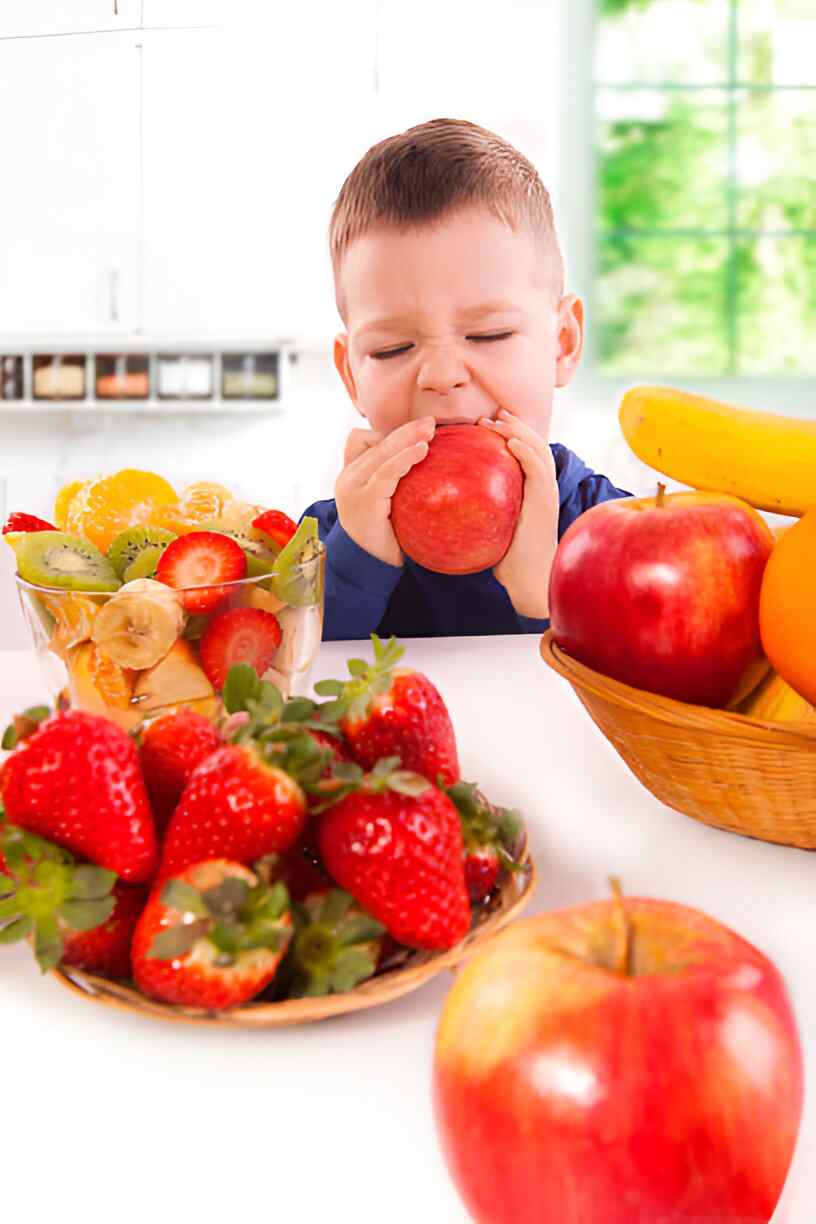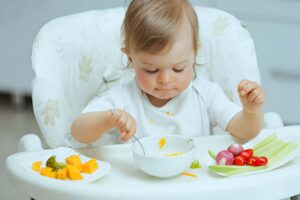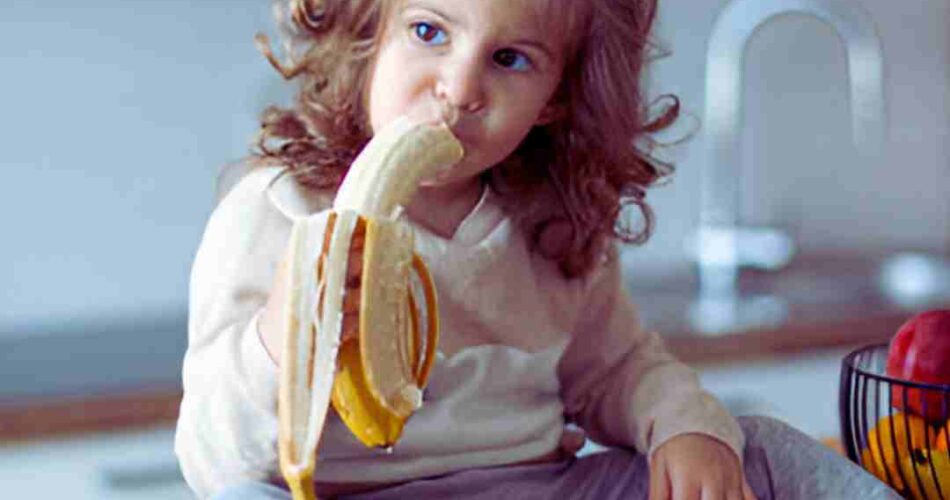Why Does My Toddler Only Want to Eat Fruit?
Imagine your toddler ignoring your well-balanced plate of fluffy rice, steamed broccoli, and tender chicken in favour of a single banana slice. Indeed, their small hands appear to be drawn to watermelon, apples, and grapes throughout the day. Despite fruit’s unquestionable high vitamin and fibre content, a diet that consists primarily of it may deprive children of vital minerals, healthy fats, and protein.
Many little ones go through phases where fruit feels like the only food worth eating—sweet, colorful, and easy to chew, it’s no wonder they love it! But as a parent, you may wonder if this is normal, healthy, or something to worry about. Let’s find out why toddlers often fixate on fruit and what you can do to encourage a more balanced diet.

Why Does My Toddler Only Want to Eat Fruit?
It’s normal for toddlers to go through times when they really like certain foods. You’re not the only one whose kid loves fruit! There are a lot of reasons why this could be happening, and most of them are perfectly normal and even good for you.
1. Natural sweetness
Fruit is sweet by itself, and toddlers naturally like sweet things. This is a survival instinct that makes them want to eat foods that give them a lot of energy. Fruits taste better than bitter vegetables or savory meals because they have a burst of flavor and are ready to eat right away.
Don’t miss:
2. Good Feel
A lot of fruits are soft, juicy, and easy to chew, which makes them great for kids who are still getting used to solid foods. The texture can be more pleasant and comforting than tougher foods like meats or raw vegetables.
3. Vibrant colors.
Toddlers may find brightly colored fruits like strawberries, bananas, oranges, and grapes exciting and interesting to look at. They might be more appealing than other foods because they look fun.
4. Predictable Taste
Some foods mix a lot of different ingredients and spices, but fruits usually have the same taste. Toddlers don’t like surprises in their food, so they might like fruit better because it’s always the same.
5. Positive Remarks
Your toddler may view fruit as something that brings them joy and love if they have received praise or positive feedback for picking or eating it. People may repeat the same behavior as a result of this.
6. Easy to access
Your toddler may eat fruits more frequently than other foods because they are a popular snack or quick way to satisfy hunger. Repeated exposure makes things more recognizable and likable.
7. Teething Relief.
Gum soreness can be alleviated by eating cold or juicy fruits, such as watermelon, chilled grapes, or soft mangoes. Your toddler may benefit from eating fruit if they are teething because it soothes and cools them down.
8. Simple Digestion
Fruits are easy to digest and can help prevent constipation because of their high water and fiber content. If your toddler has had stomach problems in the past, their body may naturally turn to fruit for relief.
9. Copying siblings or adults.
If your toddler observes other family members regularly eating and enjoying fruit, they might mimic that behavior, particularly if those instances are social and upbeat.
10. Advantageous Early Exposure
Your toddler may come to associate fruit with comfort, love, and fulfillment if you introduced it early in the weaning process and made it enjoyable.
11. Phase of Low Food Variety
Toddlers frequently experience “food jags,” or periods when they want to eat the same thing repeatedly. Fruit might be their short-term comfort zone if it’s their current favorite.
12. Self-reliance and command
Your toddler may feel more in control if they select fruit. Fruits may appreciate the independence because they are frequently served whole (such as a banana or a slice of apple).
13. Food Allergy or Food Sensitivity
A child might skip certain food groups from time to time because they are uncomfortable but can’t say why. For example, they might get mild reactions or bloating. They might keep eating fruit if they think it’s “safe.”

Benefits of Fruits
Fruits are a great source of nutrients and are crucial for kids’ development. Why does my toddler only want to eat fruit? These are some of the main benefits of fruits for children
1. Enhances Digestion
Dietary fiber, which is abundant in fruits, keeps your child’s digestive system healthy and helps avoid constipation. Apples, pears, and prunes, for instance, are excellent for regular bowel movements.
2. Promotes Healthy Growth and Development
Fruits provide essential nutrients needed for bone strength, brain development, and healthy skin. For instance, berries are great for brain health, while citrus fruits support collagen for strong bones and skin.
3. Boosts Immunity
Vitamin C, which is abundant in fruits like oranges, mangoes, and strawberries, helps boost your child’s immune system and reduce their vulnerability to infections and colds.
4. Hydrates the body.
Many fruits, such as pineapple, oranges, and watermelon, are high in water, they help kids stay hydrated, especially during hot weather.
5. Supports Healthy Weight
Fruits provide kids with satisfying, nutrient-dense options that promote healthy weight management while also reducing excess calorie intake.
6. Enhances Concentration and Learning
Nutrients in fruits like blueberries and bananas give the brain energy, which helps children focus better in school.
7. Good for Dental Health
Nutrients in crunchy fruits like apples and pears can help clean teeth naturally and stimulate gums.

Is it bad if my toddler only eats fruit?
It can be concerning when your child seems happy eating only berries, bananas, and apples—after all, fruit is delicious and a good source of vitamins!
Why does my toddler only want to eat fruit? However, if your toddler actually only eats fruit, you may face some difficulties.
1. Protein deficiency
Protein serves as the building block for the development of immune cells, muscles, and bones. Leo, the two-year-old son of my friend Jane, would eat strawberries all day long but would not even accept a spoonful of yogurt. After six months, Leo was too exhausted to chase the dog around the yard and was underweight for his age.
2. Too much sugar
Although fruit naturally contains sugar, overconsumption of fruit sugars (fructose) can lead to dental cavities, stomachaches, and blood-sugar dips that make your toddler grumpy.
3. Lack of healthy fats and iron
Iron transports oxygen in the blood, while fat aids in brain development. Fruit alone doesn’t provide all the essential nutrients toddlers need and lack of these nutrients is harmful to their health.
4. Lack of calcium and vitamin D
Strong bones and teeth require calcium and vitamin D. Fruits don’t contain these nutrients as much as dairy products and fortified foods do. Lack of them can lead to rickets or weak bones.
5. Lack of Variety in Fiber
Although fiber is found in fruit, different plant-based foods (such as grains, legumes, and vegetables) provide different kinds of fiber and prebiotics that promote gut flora and healthy digestion.
6. Insufficient Experience with Tastes and Textures
Due to lack of exposure, toddlers who only eat fruit may grow up to be finicky eaters and reject other foods.
7. Temporary Fullness Without Persistent Vitality.
Fruit fiber aids in digestion but does not provide children with a sustained sense of fullness. Your toddler might eat some fruit, feel full, and then feel hungry again very quickly.
8. Oral health conditions
Berries, pineapples, and oranges are examples of fruits with an acidic flavor. When teeth aren’t cleaned properly, regular eating can erode tooth enamel and cause cavities. This is a bigger issue if fruit consumption is not controlled throughout the day.

How to encourage food varieties in toddlers
A toddler who only wants to eat fruit can benefit from the following useful techniques to promote variety:
1. Combine Fruits and Other Foods
Serve fruit with small servings of grains or protein (strawberries with oatmeal, banana with yogurt, or apple slices with peanut butter. Fruit serves as a link to other food groups because of this.
2. Incorporate Play and Fun into Food
Transform meals into a vibrant “rainbow plate” with additional foods, such as fruits and vegetables. To make vegetables, cheese, or sandwiches look as good as fruit, use cookie cutters.
3. Mix and Blend
Smoothies are a great way to keep fruit as the main flavor while sneaking in oats, yogurt, or vegetables. For instance, mix spinach, berries, banana, and a little milk.
4. Provide Options Rather Than Pressure
You can choose to ask, “would you like cucumber slices or carrot sticks with your apple?” Giving kids a choice makes them feel more in control.
5. Take the Lead
Consume diverse foods for yourself. When they see you regularly enjoying something, toddlers are more likely to try it too.
6. Maintain Your Routine
Serve healthy snacks and meals on a regular basis. Your toddler may reject other foods if fruit is always available. Establishing structure fosters acceptance.
7. Make use of recognizable flavors and textures
Some toddlers are resistant to new foods due to their texture. Since they taste the most like fruit, start with soft, sweet vegetables (such as butternut squash or roasted sweet potatoes).

8. Let Your Toddler Help Prepare Food
Allow them to choose a new food at the grocery store, wash vegetables, or stir yogurt. Being involved increases their interest in giving it a try.
9. Introduce Slowly and Repeatedly
Before a toddler accepts a new food, it may take ten to fifteen tries. Continue serving modest portions without exerting any pressure.
11. Talk to your pediatrician:
If your toddler is refusing all foods except fruit, a doctor or dietitian can help check for nutritional gaps and offer tailored strategies.
Why Does My Toddler Only Want to Eat Fruit?
At the end, the sweetness, good feel, and vibrant colors of fruit are often more important to a toddler than any potential risks. Fruit is beneficial, but balance is essential, so continue to introduce other foods to them gradually in addition to their favorites. The “fruit-only” phase will pass and your child will learn to appreciate a wider plate of delicious food with time, variety, and a little imagination.

